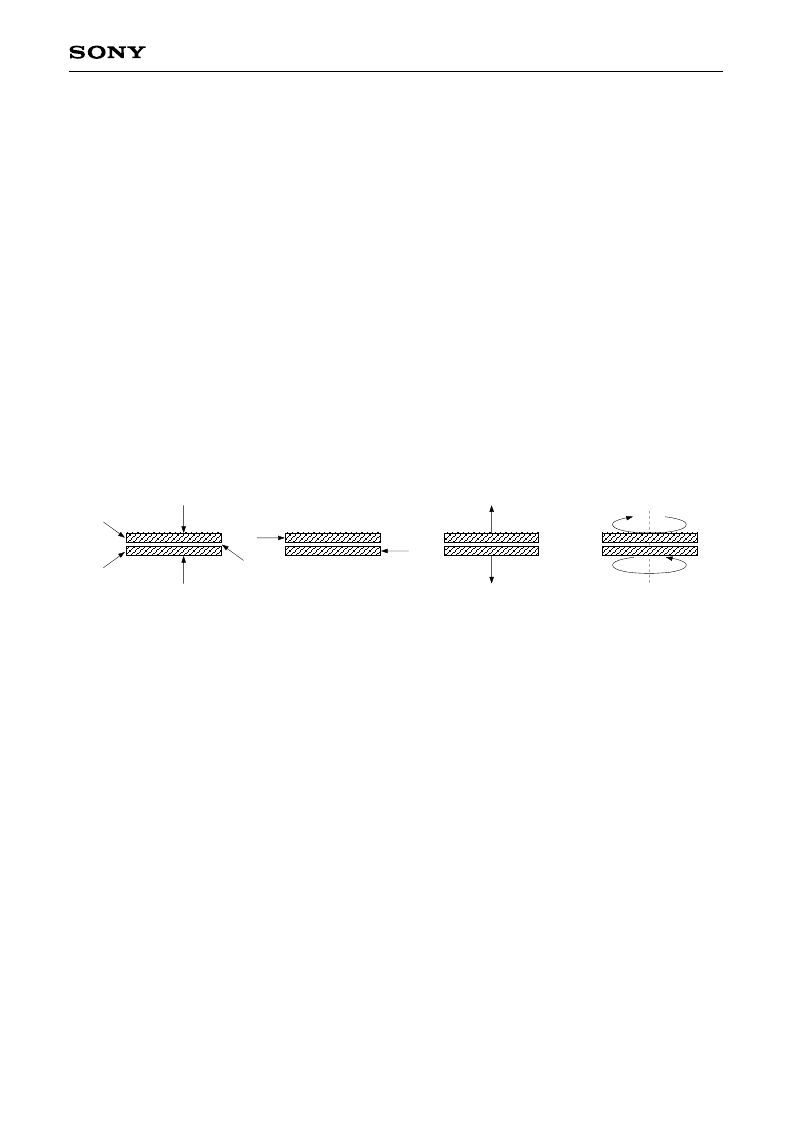- 您現(xiàn)在的位置:買賣IC網(wǎng) > PDF目錄383107 > ILX533K (Sony Corporation) 2700 pixel X 3 line CCD Linear Sensor (Color) PDF資料下載
參數(shù)資料
| 型號: | ILX533K |
| 廠商: | Sony Corporation |
| 英文描述: | 2700 pixel X 3 line CCD Linear Sensor (Color) |
| 中文描述: | 2700像素× 3線CCD線性傳感器(彩色) |
| 文件頁數(shù): | 9/11頁 |
| 文件大小: | 129K |
| 代理商: | ILX533K |

– 9 –
ILX533K
Notes of Handling
1) Static charge prevention
CCD image sensors are easily damaged by static discharge. Before handling be sure to take the following
protective measures.
a) Either handle bare handed or use non chargeable gloves, clothes or material.
Also use conductive shoes.
b) When handling directly use an earth band.
c) Install a conductive mat on the floor or working table to prevent the generation of static electricity.
d) Ionized air is recommended for discharge when handling CCD image sensor.
e) For the shipment of mounted substrates, use boxes treated for prevention of static charges.
2) Notes on Handling CCD Cer-DIP Packages
The following points should be observed when handling and installing cer-DIP packages.
a) Remain within the following limits when applying static load to the ceramic portion of the package:
(1)Compressive strength:39N/surface (Do not apply load more than 0.7mm inside the outer perimeter of
the glass portion.)
(2)Shearing strength: 29N/surface
(3)Tensile strength: 29N/surface
(4)Torsional strength: 0.9Nm
b) In addition, if a load is applied to the entire surface by a hard component, bending stress may be
generated and the package may fracture, etc., depending on the flatness of the ceramic portion.
Therefore, for installation, either use an elastic load, such as a spring plate, or an adhesive.
c) Be aware that any of the following can cause the glass to crack: because the upper and lower ceramic
layers are shielded by low-melting glass,
(1)Applying repetitive bending stress to the external leads.
(2)Applying heat to the external leads for an extended period of time with soldering iron.
(3)Rapid cooling or heating.
(4)Rapid cooling or impact to a limited portion of the low-melting glass with a small-tipped tool such as
tweezers.
(5)Prying the upper or lower ceramic layers away at a support point of the low-melting glass.
Note that the preceding notes should also be observed when removing a component from a board after it
has already been soldered.
3) Soldering
a) Make sure the package temperature does not exceed 80°C.
b) Solder dipping in a mounting furnace causes damage to the glass and other defects. Use a grounded 30W
soldering iron and solder each pin in less then 2 seconds. For repairs and remount, cool sufficiently.
c) To dismount an imaging device, do not use a solder suction equipment. When using an electric
desoldering tool, ground the controller. For the control system, use a zero cross type.
lower ceramic layer
AAAA
AAAA
AAAA
AAAA
AAAA
Low-melting glass
(1)
Upper ceramic layer
相關(guān)PDF資料 |
PDF描述 |
|---|---|
| ILX533KB | 2700 pixel X 3 line CCD Linear Sensor (Color) |
| ILX535 | 5300 pixel X 3 line CCD Linear Sensor (Color) |
| ILX535K | 5300 pixel X 3 line CCD Linear Sensor (Color) |
| ILX547K | 2700 X 3 pixel CCD Linear Sensor (Color) |
| ILX548K | 5340 pixel 】 3 line CCD Linear Sensor (Color) |
相關(guān)代理商/技術(shù)參數(shù) |
參數(shù)描述 |
|---|---|
| ILX533KB | 制造商:SONY 制造商全稱:Sony Corporation 功能描述:2700 pixel X 3 line CCD Linear Sensor (Color) |
| ILX535 | 制造商:SONY 制造商全稱:Sony Corporation 功能描述:5300 pixel X 3 line CCD Linear Sensor (Color) |
| ILX535K | 制造商:SONY 制造商全稱:Sony Corporation 功能描述:5300 pixel X 3 line CCD Linear Sensor (Color) |
| ILX536K | 制造商:未知廠家 制造商全稱:未知廠家 功能描述:LINEAR CCD IMAGE ARRAY |
| ILX537K | 制造商:未知廠家 制造商全稱:未知廠家 功能描述:LINEAR CCD IMAGE ARRAY |
發(fā)布緊急采購,3分鐘左右您將得到回復(fù)。